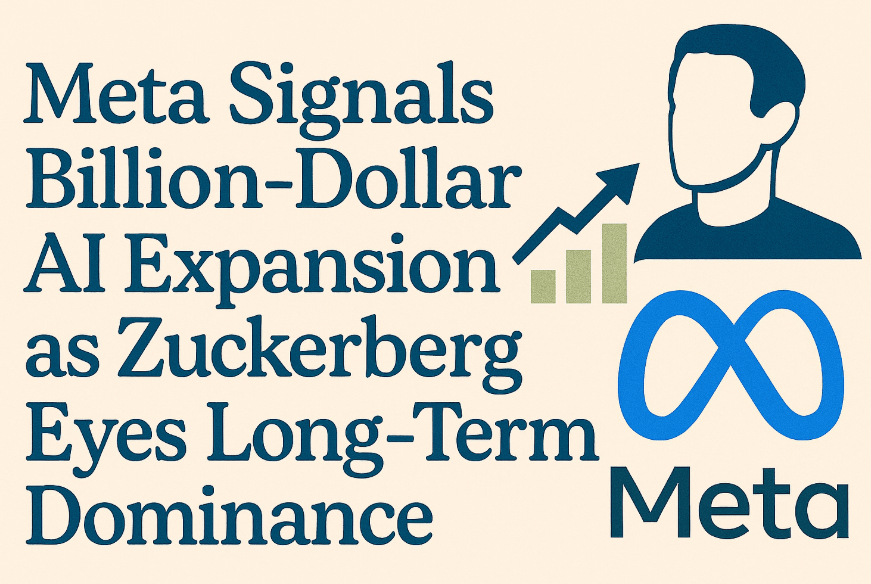- Live Life Grow Wealth
- Posts
- Meta Signals Billion-Dollar AI Expansion as Zuckerberg Eyes Long-Term Dominance
Meta Signals Billion-Dollar AI Expansion as Zuckerberg Eyes Long-Term Dominance

Today’s Headline
Meta Forecasts Bigger Capital Costs Next Year as Zuckerberg Lays Out Aggressive AI Buildout
When I first read that Meta is forecasting higher capital expenses for next year, my initial thought was: Here we go again — another big tech company pouring billions into AI. But then I paused and looked deeper. What Mark Zuckerberg is planning isn’t just another corporate buzzword project. It’s a long-term bet — one that could reshape how Meta operates, earns money, and competes in the fast-evolving artificial intelligence race.
Let’s break this down in a simple, human way — because while most headlines sound complicated, what’s really happening is quite fascinating (and potentially very profitable for investors who pay attention).
Want to get smarter — not just richer? Tap into curated financial wisdom from Money and stay ahead of the next big move in investing.
Get home insurance that protects what you need
Standard home insurance doesn’t cover everything—floods, earthquakes, or coverage for valuable items like jewelry and art often require separate policies or endorsements. Switching over to a more customizable policy ensures you’re paying for what you really need. Use Money’s home insurance tool to find the right coverage for you.
The Big Picture: Why Meta Is Spending More
Meta (the parent company of Facebook, Instagram, and WhatsApp) just announced that it expects capital expenditures to jump significantly in 2026. This means more money is going into data centers, chips, AI models, and infrastructure.
In plain terms, Zuckerberg is building the engine that will power Meta’s next decade. Right now, AI is the new oil — and whoever builds the best “engine” to process and use that oil will dominate the digital world.
Zuckerberg said that Meta is “entering a new era of efficiency and capability,” which basically means they’re not just spending for fun. They’re building the backbone for massive AI operations — things like generative AI assistants, smarter recommendation systems, and even new ad tools that understand user behavior far better than before.
The AI Arms Race — Meta Wants a Front Seat
Let’s be honest: Meta doesn’t want to be left behind. OpenAI, Google, and Microsoft have been stealing the spotlight lately. ChatGPT, Gemini, and Copilot — these names are everywhere.
So, what’s Meta’s move? It’s to become the go-to AI company for personal and social experiences.
While other tech giants are building AI for work and enterprise, Meta is building AI for you — the individual user scrolling Instagram, messaging friends, or buying something you saw on Facebook Marketplace.
They’re quietly weaving AI into every interaction. You’ll soon see it in:
Smarter Reels recommendations that know exactly what you want to watch next.
AI chatbots that help you shop directly through Messenger.
Virtual worlds in Horizon where AI-generated environments feel alive.
And eventually, AI-powered glasses that act like real-world assistants.
To make this happen, Meta needs enormous computing power — hence, the “bigger capital costs” next year.
Zuckerberg’s Vision: “The Year of AI at Meta”
Zuckerberg has been calling this Meta’s “year of AI.” That’s no small statement.
For years, the company was focused on the metaverse, spending billions on VR headsets and digital avatars. While that still matters, the focus has shifted — now AI is the center of everything.
Here’s what Zuckerberg is doing differently:
Building custom AI chips — instead of renting computing power from Nvidia or AWS, Meta is developing its own silicon to reduce long-term costs.
Expanding data centers — these aren’t just storage facilities; they’re advanced supercomputing hubs designed for large-scale AI training.
Hiring top AI talent — Meta is quietly poaching engineers from DeepMind, OpenAI, and Anthropic.
Integrating AI into products — every app in the Meta ecosystem will soon have some form of personal AI assistant or recommendation model.
So when Meta says capital expenses will rise, it’s not just for maintenance. It’s for transformation.
Why This Matters to Investors
Now, as someone who watches the markets closely, I always remind myself of one key thing: spending isn’t bad — as long as it’s strategic.
Meta’s increased capital spending might scare short-term investors. They’ll say, “Oh no, margins will shrink!” But long-term investors see it differently. They see a company reinvesting profits into the very thing that will keep it relevant for decades.
Here’s why this could actually be bullish for Meta stock:
AI will drive ad efficiency. Meta’s AI algorithms already generate record ad performance. With more investment, expect even better ad targeting, lower costs, and higher returns for advertisers. That means more revenue for Meta.
AI could unlock new business models. Imagine Meta launching a paid AI assistant within WhatsApp or Instagram. A personal chatbot that helps you book travel, shop, or manage your life. That’s a whole new revenue stream.
AI infrastructure is long-term value. Building data centers and chips now means Meta won’t rely on others later. It’s like owning the oil rigs instead of buying barrels.
Investors trust execution. Let’s not forget: every time people doubted Zuckerberg — from the mobile shift to the Reels strategy — he proved them wrong.
The Risk Side — Because There’s Always One
Of course, I wouldn’t be honest if I didn’t talk about the risks.
There’s a fine line between investing for growth and overspending without clear returns. Meta has to prove that its AI spending will lead to tangible results.
Some key concerns include:
Ad saturation: Most of Meta’s revenue still comes from advertising. Can AI really add enough new value to justify these billions in expenses?
Regulatory pressure: AI privacy concerns and data usage laws could slow down innovation.
Competition: Every tech company is chasing the same goal. Google, Microsoft, and Amazon are pouring just as much money into AI — maybe even more.
Still, when you compare Meta’s current profitability to its level of spending, it’s clear they can afford to take these risks.
Myth: Pet insurance doesn’t cover everything
Many pet owners worry that insurance won’t cover everything, especially routine care or pre-existing conditions. While that’s true in many cases, most insurers now offer wellness add-ons for preventive care like vaccines, dental cleanings, and check-ups, giving you more complete coverage. View Money’s pet insurance list to find plans for as low as $10 a month.
The Bigger Picture — AI Is Meta’s Second Reinvention
If you look at Meta’s history, this isn’t the first time it’s had to reinvent itself.
When Facebook’s user growth slowed, it pivoted to Instagram and Stories.
When TikTok exploded, Meta adapted quickly with Reels.
And when Apple’s privacy rules hit its ad business, Meta rebuilt its entire targeting system with AI.
Now, this AI buildout marks Meta’s second great transformation.
What we’re witnessing is a company preparing for a future where the line between social media, search, and AI blurs completely. Imagine opening Instagram and not just seeing posts — but being able to ask your feed for recommendations, trip plans, or business ideas. That’s where Meta is heading.
Meta’s Financial Power Gives It an Edge
One thing I’ve learned watching tech companies over the years: innovation alone isn’t enough — you need capital strength.
Meta generated nearly $50 billion in free cash flow over the past year. That’s massive. It gives Zuckerberg the ability to spend big without borrowing or sacrificing profits too much.
Compare that to smaller AI startups struggling to raise funding. Meta can outspend and outlast most of them.
That’s why I see Meta’s increased capital costs as a calculated power move, not a reckless gamble.
What I Find Impressive About Meta’s AI Push
If you ask me what stands out most, it’s how Meta is building AI for scale — not just one flashy product.
Here’s what that means:
They’re training foundation models — massive AIs that can be adapted across multiple uses.
Their AI systems are already improving ad ROI and engagement rates.
They’re embedding AI into all consumer products, not launching standalone tools.
This strategy reminds me of how Meta approached mobile 10 years ago. They didn’t just build a mobile app; they rebuilt their entire company around it. AI is getting that same treatment today.
|
What Could This Mean for Meta Stock?
Let’s talk numbers for a second.
If Meta continues on this trajectory, the next few quarters could look like this:
Short-term: Earnings may fluctuate due to heavy spending. Don’t be surprised if margins dip slightly.
Medium-term: Ad efficiency rises, engagement increases, and AI products start contributing directly to revenue.
Long-term: Meta could emerge as the consumer-facing AI leader, rivaling even Microsoft and Google.
It’s a classic example of short-term pain for long-term gain.
That’s why many analysts, despite cautioning about higher costs, still maintain “buy” ratings for the stock.
My Advice to Investors
If you’re reading this as an investor wondering what to do, here’s my honest take.
Don’t just look at Meta’s next quarter — look at its next decade.
Ask yourself:
Which companies have the scale, data, and cash to dominate AI?
Which ones can integrate AI seamlessly into products billions already use daily?
Meta checks both boxes.
So, if you already hold the stock, it might be worth keeping it long-term. If you’re considering buying, wait for a market pullback — that’s often when great companies trade at a discount before their next big leg up.
Takeaway — The Future Belongs to the AI Builders
We’re entering an era where AI will decide the next generation of tech winners. And Meta, once again, is positioning itself to lead that wave.
Yes, the spending looks heavy. Yes, risks remain. But the direction is clear — this is Meta’s next evolution.
Zuckerberg’s aggressive AI buildout isn’t just about keeping up with competitors. It’s about redefining the company for the next era of computing.
If you believe in the power of long-term vision, Meta’s strategy might just be the blueprint for how giants stay on top — by betting big when everyone else hesitates.
Final Takeaways
When a company like Meta, with its cash reserves and track record, doubles down on AI, it’s rarely a coincidence. It’s preparation. And for investors like us, understanding why they’re making that move can help us stay ahead of the next big wave — not just watch it from the sidelines.
[Live Life Grow Wealth]
🎓 Free Masterclasses to Unlock Your Investment Potential
Take your money skills to the next level with expert-led workshops designed to help you grow smarter and faster.
Recommendations Section
|
|
|
DISCLAIMER
I make no representations, warranties, or guarantees, whether expressed or implied, that the content provided is accurate, complete, or up-to-date. Past performance is not indicative nor a guarantee of future returns.
I am an individual content creator and not regulated or licensed by the Monetary Authority of Singapore (MAS) as I do not provide investment services.
All forms of investments carry risks, including the risk of losing your entire invested amount. Such activities may not be suitable for everyone. You are strongly encouraged to seek advice from a professional financial advisor if you have any doubts or concerns.








